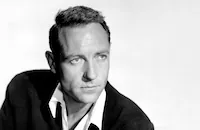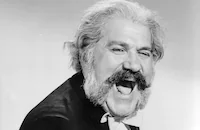The Unsinkable Molly Brown

Brief Synopsis
Cast & Crew
Charles Walters
Debbie Reynolds
Harve Presnell
Ed Begley
Jack Kruschen
Hermione Baddeley
Film Details
Technical Specs

Synopsis
Molly, a tomboy orphan rescued from the Colorado River and brought up by Shamus Tobin, sets out to find a rich husband. Arriving in Leadville, she gets a job singing in Christmas Morgan's saloon. En route she has met Johnny Brown, and when he refurbishes her cabin, she marries him. Johnny, wishing to satisfy Molly's hunger for money, sells her silver mine for $300,000, but the paper currency is burned accidentally after Molly hides it in the stove. Comforting her, Johnny tosses his pickax in the air, and it cracks open the richest gold vein in Colorado history. The Browns and Shamus move into a mansion in Denver, where the unpolished Molly hopes to break into society but is thoroughly snubbed by the elite. The Browns then go to Europe, where Molly becomes the toast of royalty. They return to Denver, bringing along their royal friends, and Molly's party to introduce them to Denver society is a success until Johnny's Leadville friends show up and turn it into a free-for-all. Rejected once more, Molly returns to Europe despite Johnny's warning that the separation will end their marriage. He returns to Leadville. In Europe, Prince de Lanière falls in love with Molly, but she decides to go back to Johnny. She sails on the Titanic , and when the ship sinks, Molly saves the lives of the people in an overcrowded lifeboat. Her courage and selflessness make worldwide headlines, and all Denver at last welcomes her home with open arms. And Johnny, too, is on hand to welcome Molly. Songs : "I Ain't Down Yet" (Molly), "Colorado Is My Home" (Johnny), "Belly Up to the Bar, Boys" (Molly), "I'll Never Say No" (Molly), "Leadville Johnny Brown [Soliloquy]" (Johnny), "He's My Friend" (Molly & Cast).

Director

Charles Walters
Cast

Debbie Reynolds
Harve Presnell

Ed Begley

Jack Kruschen

Hermione Baddeley
Vassili Lambrinos
Fred Essler

Harvey Lembeck
Lauren Gilbert
Kathryn Card
Hayden Rorke
Harry Holcombe
Amy Douglass
George Mitchell
Martita Hunt

Vaughn Taylor
Antony Eustrel

Audrey Christie
Grover Dale
Brendan Dillon
Maria Karnilova
Gus Trikonis
Mary Ann Niles

Anna Lee
George Nicholson
Ramsay Hill
Moyna Macgill
Pat Benedetto
Mary Andre
Pat Moran
Herb Vigran
Eleanor Audley
Crew
Preston Ames
Robert Armbruster
Leo Arnaud
Alexander Courage
George W. Davis
Helen Deutsch
Roger Edens
Roger Edens
Jack Elliott
Daniel L. Fapp
Peter Gennaro
A. Arnold Gillespie
Henry Grace
Sydney Guilaroff
Morton Haack
Robert R. Hoag
Hugh Hunt
Calvin Jackson
J. Mcmillan Johnson
Larry Jost
Franklin Milton
Hank Moonjean
National Park Service
Fredric Steinkamp
William Tuttle
Lawrence Weingarten
Meredith Willson

Photo Collections
Videos
Movie Clip


Trailer
Hosted Intro



Film Details
Technical Specs

Award Nominations
Best Actress
Best Art Direction
Best Cinematography
Best Costume Design
Best Score
Best Sound
Articles
The Unsinkable Molly Brown
Meredith Willson adapted Molly Brown's biography to the Broadway stage as a follow-up to his first major hit, The Music Man. Though The Unsinkable Molly Brown was not an unqualified smash, it made stars out of leading players Tammy Grimes and Harve Presnell. With the success of The Music Man on film, MGM was eager to pick up the rights to a similar musical. It would become the studio's last great musical film.
The young, handsome Presnell was a natural for films and would be the only member of the original cast invited to reprise his role. As successful as Grimes had been on Broadway, however, Hollywood already had an ideal choice for Molly Brown, Shirley MacLaine, and she was eager to play the role. No sooner had she signed, however, than independent producer Hal Wallis, who had brought her to Hollywood in the '50s, claimed that she was still under contract to him. The legal complications forced MacLaine to withdraw from the role, which producer Lawrence Weingarten then offered to Reynolds. She jumped at the opportunity to star in a big musical of her own, even though she had to accept a lower fee than had been offered to MacLaine.
Then the trouble started. First, Reynolds had to deal with MacLaine, who accused her of undercutting MacLaine's price to steal the role from her. Reynolds did her best to mollify her, arguing that MGM couldn't make the film with Wallis threatening a lawsuit and pleading that it was her last chance for a great film role. On the whole, she got off easier than Hollywood Reporter columnist Mike Connolly. When he reported that MacLaine had lost the part before any decision had even been made, she decked him.
Reynolds' next hurdle was director Charles Walters. Although he had scored a hit directing her opposite Frank Sinatra in The Tender Trap (1955), he had his heart set on casting MacLaine as Molly Brown. He even tried to convince Reynolds to turn the part down. When she asked why he thought she was wrong for it, he told her, "You're much too short for the role." Reynolds quipped, "How short is the part?" then told him he was just plain wrong. His doubts continued through the location shooting in Colorado. In fact, he gave her so little direction that Reynolds turned to Lillian Burns, an accomplished acting coach with whom she had worked in her early days at MGM, to help her with the part. Finally, when the rushes started coming in, Walters conceded that she was right for the role. His doubts came back, however, when it came time to shoot Reynolds' biggest dance number, "He's My Friend." He even suggesting cutting it, claiming it was too tough for her to learn, but Reynolds insisted. MGM had slashed the film's budget because of cost overruns on Doctor Zhivago (1965), so Walters had to try to get the number in as few takes as possible. As insurance, he had TWO cameras simultaneously film a long take of the seven-minute number, a television technique rarely used on film. Reynolds pulled the number off without a hitch, though one of her male dancing partners fainted after it was over.
The Unsinkable Molly Brown turned out to be a huge hit for MGM, becoming the third highest-grossing film of 1964. The picture garnered six Oscar® nominations, including Reynolds' Best Actress nod. She would prove wrong in her prediction that this would be her last great role. She would go on to turn in an Oscar®-worthy performance in Albert Brooks' 1996 comedy Mother. She and MacLaine would survive their differences, eventually teaming up for the television movie These Old Broads in 2001. Before that, MacLaine would play a role loosely based on Reynolds -- and with her blessing -- as the movie star mom in Postcards From the Edge (1990), written by Reynolds' daughter, Carrie Fisher.
Producer: Lawrence Weingarten
Director: Charles Walters
Screenplay: Helen Deutsch
Based on the Stage Musical by Meredith Willson & Richard Morris
Cinematography: Daniel L. Fapp
Art Direction: George W. Davis & E. Preston Ames
Music: Meredith Willson
Principal Cast: Debbie Reynolds (Molly Brown), Harve Presnell (Johnny Brown), Ed Begley (Shamus Tobin), Jack Kruschen (Christmas Morgan), Hermione Baddeley (Mrs. Grogan), Vassili Lambrinos (Prince Louis de Laniere), Harvey Lembeck (Polak), Hayden Rorke (Broderick), Martita Hunt (Grand Duchess Elise Lupovinova), Audrey Christie (Mrs. McGraw), Grover Dale (Jam), Maria Karnilova (Daphne), Gus Trikonis (Joe).
C-129m. Letterboxed. Closed captioning.
by Frank Miller

The Unsinkable Molly Brown
Quotes
It's not the money I love, it's the not having it I hate.- Molly Brown
Molly sure know what she was doin' when she made this place red. The blood don't show.- Shamus Tobin
Trivia
Notes
Location scenes were filmed at Black Canyon, in the Gunniston National Monument Park in Colorado. Actor Harve Presnell, who reprised his role from the Broadway production, made his feature film debut in the picture.

Miscellaneous Notes
Released in United States Summer June 1964
Story is based on a real-life character.
Released in USA on video.
Released in United States Summer June 1964














